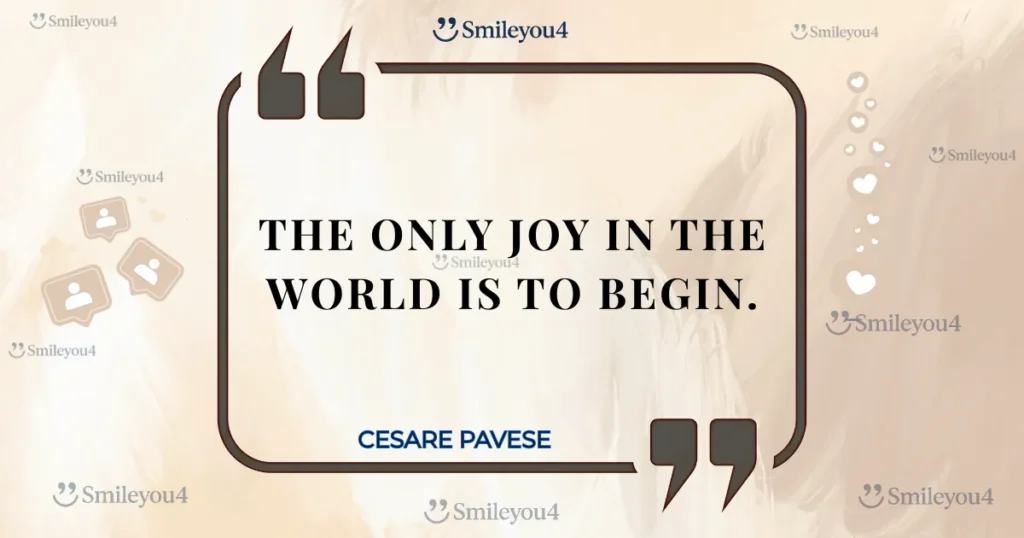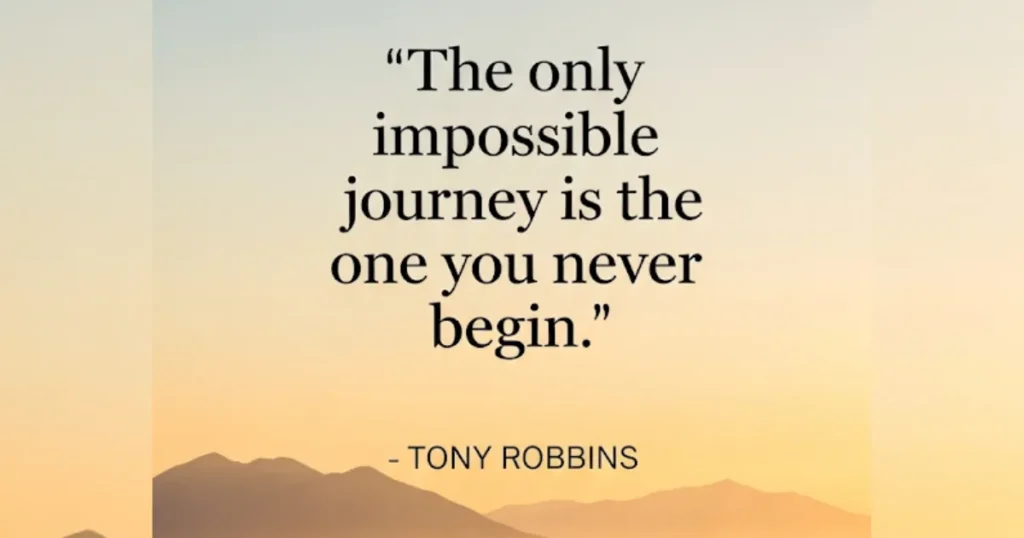What if the secret to lasting happiness isn’t found in finishing projects, achieving goals, or reaching destinations—but simply in taking that very first step? Italian writer Cesare Pavese understood something profound about human nature when he wrote, “The only joy in the world is to begin.” This the only joy is to begin Cesare Pavese wisdom isn’t just poetic—it’s a life-changing truth that can transform how you approach every dream, goal, and aspiration.

You’ve felt it before: that electric excitement when you start something new. Whether it’s the first page of a book you’re writing, the opening day of a new job, or even just deciding to learn a new skill—beginnings carry a unique energy that nothing else can match. That rush isn’t coincidence; it’s your soul recognizing its natural state of growth and possibility.
Today, we’ll explore why Cesare Pavese the only joy is to begin remains one of the most empowering truths about human fulfillment. You’ll discover practical ways to harness the power of beginning and learn how to overcome the fears that keep you stuck on the sidelines of your own life.
Understanding Cesare Pavese’s Revolutionary Insight
The Writer Who Found Truth in New Beginnings
When Cesare Pavese declared that the only joy is to begin, he spoke from deep personal experience as both a writer and a human being navigating life’s complexities. As an Italian novelist and poet, Pavese understood that the creative process—and indeed life itself—derives its greatest satisfaction not from completion, but from initiation.
Pavese lived through challenging times, including World War II and personal struggles, yet he consistently found that new beginnings offered hope when everything else felt uncertain. His novels often explored themes of renewal, fresh starts, and the transformative power of choosing to begin again, regardless of past failures or current circumstances.
This Cesare Pavese the only joy is to begin philosophy emerges from a fundamental truth about human psychology: we are naturally wired for growth, exploration, and new experiences. When we begin something, we tap into our most essential nature as evolving beings.
Breaking Down the Quote’s Life-Changing Message
“The only joy in the world is to begin.” Let’s examine why these seven words contain the key to unlocking sustained happiness:
- “The only joy” suggests that among all possible sources of happiness, beginning stands supreme
- “In the world” indicates this truth applies universally, across all cultures and circumstances
- “Is to begin” positions starting as an active choice that creates immediate fulfillment
This the only joy is to begin Cesare Pavese insight works because it shifts our focus from outcomes (which we can’t always control) to initiation (which is entirely within our power). Every moment offers you the opportunity to begin something—a new thought, a different approach, a fresh perspective.
The Science Behind the Joy of Beginning
How Your Brain Responds to New Starts
Modern neuroscience confirms what Cesare Pavese intuitively understood about the power of beginning. When you start something new, your brain undergoes remarkable changes that create genuine joy and excitement:
Neurological benefits:
- Dopamine release creates feelings of pleasure and anticipation
- New neural pathways form, enhancing cognitive flexibility
- The prefrontal cortex becomes more active, improving decision-making
- Stress hormones decrease as you focus on possibilities rather than problems
Psychological advantages:
- Increased sense of control and personal agency
- Enhanced motivation through fresh energy and purpose
- Greater resilience as you prove you can start despite fear
- Improved self-confidence with each successful initiation
This scientific backing proves that the the only joy is to begin principle isn’t just philosophical—it’s a practical strategy for activating your brain’s natural happiness circuits.
The Beginning vs. Finishing Paradox
Research reveals something surprising: people consistently experience more satisfaction from starting projects than completing them. This “beginning bias” explains why Cesare Pavese the only joy is to begin resonates so deeply with human experience.
Studies show that:
- New beginnings generate 40% more positive emotions than completions
- People report higher energy levels when initiating rather than finishing tasks
- Memory formation is strongest during start phases, making beginnings more memorable
- Motivation peaks at the beginning of endeavors, not at their conclusion
Real-Life Examples of People Who Found Joy in Beginning
Sara Blakely: From Idea to Empire Through Joyful Starting
Sara Blakely perfectly embodies the the only joy is to begin Cesare Pavese philosophy. When she had the idea for Spanx, she didn’t wait for perfect conditions or complete knowledge—she simply began. With just $5,000 and no business experience, she started cutting pantyhose in her apartment.
Her journey demonstrates key principles of joyful beginning:
- She found excitement in the act of starting, not in guaranteed outcomes
- Each small beginning (prototype, phone call, store visit) generated energy for the next
- She embraced beginner’s mind, approaching challenges with curiosity rather than fear
- Her joy came from the process of creation, not just the eventual billion-dollar success
Blakely’s story proves that Cesare Pavese was right: the greatest satisfaction comes from taking that first step into the unknown.
Colonel Sanders: Finding Joy in Beginning at 65
Harland Sanders was 65 when he began what would become KFC. After losing his restaurant, he could have accepted that his time for new beginnings had passed. Instead, he embraced the truth that the only joy is to begin, regardless of age or circumstances.
His approach showed how beginning creates joy:
- He found purpose and energy in starting his franchise journey
- Each rejection became a new beginning to refine his approach
- He chose to see setbacks as opportunities for fresh starts
- His enthusiasm for beginning again infected potential partners and customers
Sanders proved that the Cesare Pavese the only joy is to begin principle has no expiration date—you can find fulfillment in starting anew at any stage of life.
J.K. Rowling: From Rock Bottom to Beginning Again
Before Harry Potter, J.K. Rowling faced divorce, single motherhood, and unemployment. Rather than seeing these as endings, she recognized them as opportunities to begin. Her decision to start writing again, despite her circumstances, exemplifies how the only joy is to begin can transform even the darkest times.
Her experience reveals:
- Beginning provided hope when everything else seemed hopeless
- The act of starting to write gave her purpose beyond her circumstances
- Each chapter she began renewed her energy and motivation
- Her joy came from the daily choice to begin again, not just from eventual publication
Rowling’s transformation shows that Cesare Pavese understood something crucial: beginning is always available to us, regardless of our current situation.
Practical Ways to Harness the Joy of Beginning
Start Your Day with the Power of Beginning
Transform your mornings by applying the the only joy is to begin Cesare Pavese philosophy from the moment you wake up:
Morning beginning rituals:
- Begin each day by choosing one small thing you’ll start today
- Practice beginner’s mind by approaching familiar tasks with fresh curiosity
- Start a gratitude practice to begin your day with positive focus
- Begin learning something new, even if just for five minutes
Mindset preparation:
- Remember that every moment offers a chance to begin anew
- Focus on what you can start today rather than what you haven’t finished
- Choose to see challenges as invitations to begin creative solutions
- Embrace the excitement that comes with fresh starts
Apply Beginning Energy to Your Goals
Every goal becomes more achievable when you remember that Cesare Pavese the only joy is to begin:
Career advancement:
- Begin networking conversations instead of waiting for perfect opportunities
- Start developing skills before you feel completely ready
- Begin sharing your expertise through writing or speaking, however small
- Launch side projects that align with your career aspirations
Personal growth:
- Begin reading books that challenge your thinking
- Start exercising, even if just for ten minutes daily
- Begin meditation or mindfulness practices in small, manageable steps
- Launch creative projects that bring you joy, regardless of your skill level
Relationships:
- Begin conversations with people who inspire you
- Start expressing appreciation to people you care about
- Begin setting healthy boundaries in relationships that drain you
- Launch new traditions with family and friends
Create Your Personal Beginning Practice
Develop systems that help you consistently tap into the the only joy is to begin energy:
Daily beginning challenges:
- Choose one thing you’ll begin each day, no matter how small
- Start a journal documenting your daily new beginnings
- Begin each work session with a moment of intention and enthusiasm
- Launch mini-experiments in areas you want to explore
Weekly fresh starts:
- Designate one day per week as your “beginning day” for starting new projects
- Begin planning your week with excitement about what you’ll initiate
- Start attending events or activities outside your comfort zone
- Launch learning challenges that excite and inspire you
Overcoming Common Obstacles to Beginning
Moving Beyond Perfectionism
Many people resist the the only joy is to begin Cesare Pavese approach because they want everything to be perfect before starting. Challenge this limiting belief:
Perfectionism busters:
- Remember that beginning is about starting, not about being ready
- Focus on progress over perfection—every start improves your skills
- Embrace the learning that comes from imperfect beginnings
- Celebrate courage over competence when you choose to begin
Practical perfectionism solutions:
- Set “good enough” standards for your first attempts
- Give yourself permission to begin messily and improve as you go
- Find examples of successful people who started before they felt ready
- Create artificial deadlines that force beginning over endless preparation
Dealing with Fear of Failure
Fear often prevents us from experiencing the joy that comes from beginning. Transform fear into fuel:
Fear reframing techniques:
- See failure as valuable data about what to try next
- Remember that not beginning guarantees you’ll never succeed
- Focus on what you’ll learn rather than what might go wrong
- Connect with others who’ve overcome similar fears to begin
Courage building practices:
- Start with small beginnings that feel manageable
- Build confidence through a series of successful small starts
- Keep a record of times when beginning led to positive outcomes
- Practice beginning in low-stakes situations to build your “starting muscle”
Handling Analysis Paralysis
Some people get stuck researching and planning instead of beginning. Break this pattern:
Action-oriented strategies:
- Set research limits—after X hours, you begin regardless
- Use the “minimum


